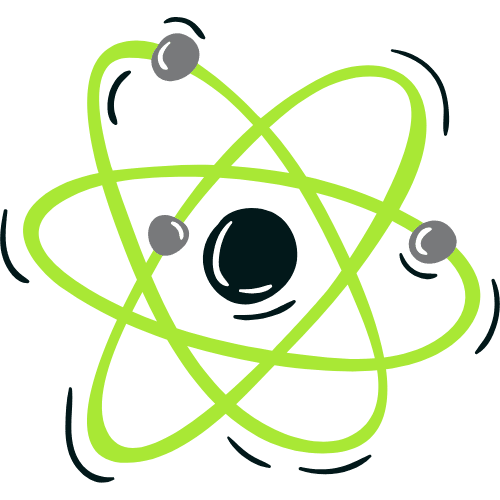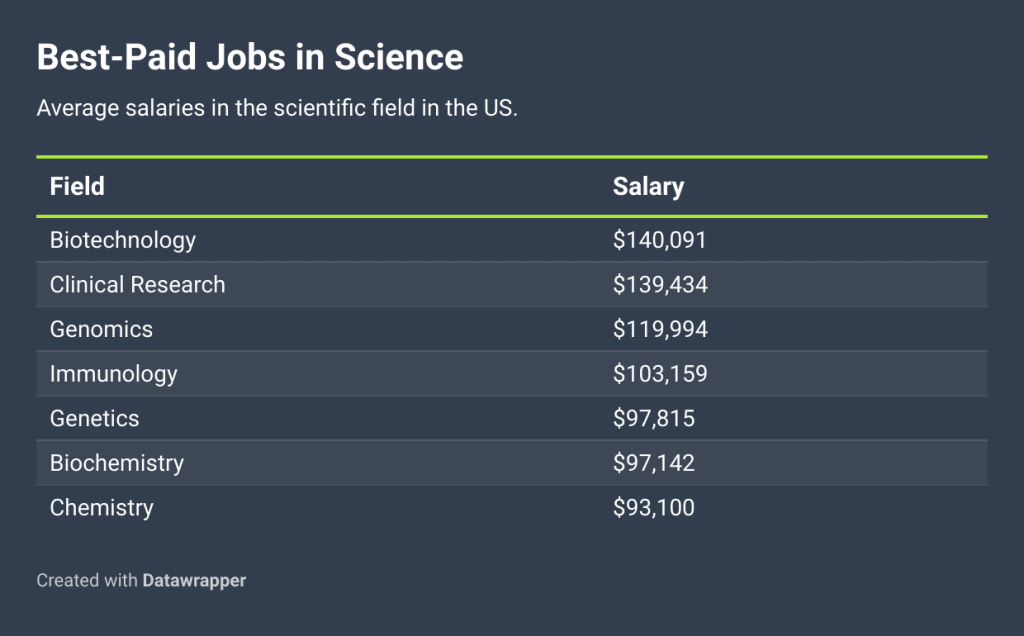

Best Opportunities in the Field
Find Your Dream Science Job!
Science careers list from A to Z—your perfect job match might be one click away.
Is Science a Good Career Choice?

A career in the science field entails studying natural phenomena, developing theories about how they work, and testing those theories through experimentation. Science jobs are some of the most secure and well-paid careers available. With a science degree, you can work in a wide range of industries, from healthcare to environmental protection.
Many science careers require advanced degrees, but there are also many opportunities for those with only a bachelor’s degree. And while it can be challenging, jobs in the science field can also be very rewarding. The satisfaction of solving complex problems and contributing to our understanding of the natural world is hard to match.
So if you’re interested in a career that is both stimulating and meaningful, science is definitely worth considering.
What Jobs Are There in Science?

There is no need to spend years and years keeping a college seat warm to make a decent income. There are many scientific jobs you can take up that require two years or less of science training to qualify.
And on that note—here are some examples to get you going.
Computer Science Jobs
Computer science is one of the fastest-growing fields today. This is due to the increasing demand for qualified computer science professionals in various industries. Jobs in computer science include software development, database administration, system analysis, and design, network security, and web development.
The average salary for a computer science job is $85,000 per year. With the rapid growth of the computer science field, there were more than one million new computer science jobs created by 2020. So if you’re looking for a stable and high-paying career, consider studying computer science.


Environmental Science Jobs
Environmental science jobs are concerned with the protection of the environment and the efficient use of natural resources. They work to find solutions to environmental problems, such as air pollution, water pollution, and climate change.
Environmental jobs can be found in the government, private industry, nonprofits, and academia. Some common job titles include environmental scientist, environmental engineer, and environmental policy analyst. The occupation typically requires at least a bachelor’s degree in environmental science or a related field. With experience, environmental science professionals can advance to management positions or become independent consultants.
Political Science Jobs
Political science is the study of government and public policy. It covers a wide range of topics, from local politics to international relations. As a result, political science jobs can be found in a variety of fields, including government, education, think tanks, and non-profit organizations.
Government jobs are the most obvious choice for political science majors. positions in federal, state, and local governments are available at all levels, from entry-level staff positions to senior policymaking roles. Many government jobs require specific skills or educational backgrounds, but many also value political science majors for their ability to analyze data and communicate clearly. Read More


Health Science Jobs
Health science jobs encompass a wide range of occupations, from counseling and research to direct patient care. Professionals in this field use their scientific knowledge to improve the health of individuals and populations.
Many health science jobs require at least a bachelor’s degree, and some may require advanced degrees or professional licenses. Some of the most common health science jobs include nurses, pharmacists, and physician assistants. With the aging of the Baby Boomer generation and the continued advancement of medical technologies, there is expected to be high demand for workers in the health sciences in the coming years. Read More
Forensic Science Jobs
Forensic science is the application of scientific methods and techniques to solve crimes. Forensic scientists collect and analyze evidence to help identify perpetrators and victims, as well as to reconstruct events. They may work in crime laboratories, police departments, or private firms.
Although many people associate forensic science with television shows such as CSI: Crime Scene Investigation, the job is actually quite different from what is portrayed on TV. Forensic scientists must have a strong understanding of the scientific method and be able to apply it to solving crimes. They must be able to think critically and pay attention to detail. In addition, they must be able to communicate their findings clearly, both in writing and in court. Although the job can be challenging, it can also be very rewarding, as forensic scientists play an important role in our justice system.


Animal Science Jobs
Animal science is a broad field that encompasses many different types of jobs. Some of the most common jobs in animal science include veterinarians, farmers, researchers, and zoologists. However, there are many other types of jobs that fall under the animal science umbrella.
For example, animal behaviorists study the way animals behave, while animal nutritionists focus on designing diets that meet the needs of both domestic and wild animals. There are also many jobs that focus on animal welfare, such as working for an animal shelter or an organization that advocates for better treatment of animals. No matter what type of job you are interested in, there is likely a place for you in the world of animal science.
What Is the Highest Paying Job in Science?


How Can I Get a Job in Science?

A career in science can be both rewarding and challenging. To be successful, you will need to have a strong foundation in math and science. You should also be able to think critically and solve problems. In addition, good communication and writing skills are essential. Here are some specific skills that you will need for a career in science:
- Biology: A deep understanding of biological concepts is essential for a career in science. You should be able to identify and describe cells, tissues, organs, and systems. You should also be familiar with the process of evolution and the diversity of life on Earth.
- Chemistry: Chemistry is the study of matter and its properties. To succeed in a career in science, you will need to have a strong grasp of basic chemical principles. You should be able to identify and classify elements and compounds. You should also be familiar with the laws of thermodynamics and kinetics.
- Physics: Physics is the study of the fundamental principles governing the behavior of matter and energy. To be successful in a career in science, you will need to have a strong understanding of physics concepts such as Newton’s laws of motion, electromagnetism, and quantum mechanics.
- Math: A solid understanding of mathematics is essential for a career in science. You should be able to solve equations and understand concepts such as calculus and statistics.
- Computer Science: Computer science is essential for a career in science. You should be familiar with programming languages and be able to use computers to process and analyze data.
- Communication: Good communication skills are essential for a career in science. You will need to be able to effectively communicate your ideas to others. You should also be able to write clear and concise reports.
- Problem Solving: Critical thinking and problem-solving skills are essential for a career in science. You should be able to identify problems and develop solutions. You should also be able to work effectively in teams.
Where to Start?

Knowledge is power—the SeedSceintific team is here to help you acquire the most relevant data to make an informed decision for yourself, whether you’re choosing a college or looking for a job in the scientific field.
